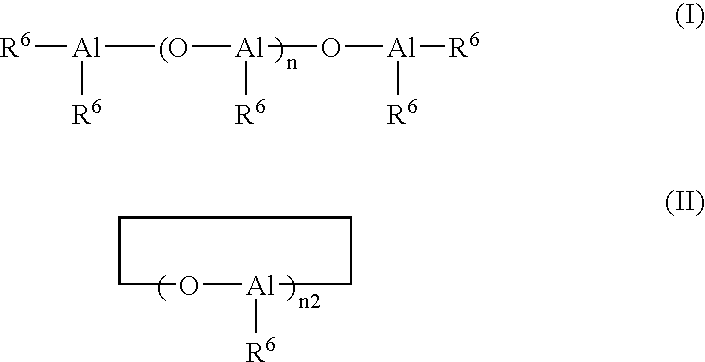Process For Producing Modified Polymer, Modified Polymer Obtained By The Process, And Rubber Composition Thereof
a technology of modified polymer and polybutadiene, which is applied in the field of process for producing modified polymer, modified polymer obtained by process, and rubber composition thereof, can solve the problems of rare cis-1,4-polybutadiene modifying effect and insufficient silica or carbon black modifying effect of rubber compositions, etc., to achieve excellent abrasion resistance, mechanical properties, and processability. , the effect of improving the ability of low heat buildup and rein
- Summary
- Abstract
- Description
- Claims
- Application Information
AI Technical Summary
Benefits of technology
Problems solved by technology
Method used
Image
Examples
example 1
Preparation of Modified Polymer A
[0154]A 5 L autoclave of which the internal atmosphere was replaced by nitrogen was charged with 2.4 kg of cyclohexane and 300 g of 1,3-butadiene. A catalyst, prepared from a cyclohexane solution of neodymium versatate (0.09 mmol), a toluene solution of methyl alumoxane (hereinafter sometimes referred to as MAO) (1.8 mmol), hydrogenation diisobutylaluminum (hereinafter sometimes referred to as DIBAH) (5.0 mmol), a toluene solution of diethylaluminum chloride (0.18 mmol), and 1,3-butadiene (4.5 mmol) by reacting and aging at 50° C. for 30 minutes, was added to polymerize the monomers at 80° C. for 60 minutes. The reaction conversion rate of 1,3-butadiene was almost 100%. The polymer solution of 200 g was extracted and a methanol solution containing 1.5 g of 2,4-di-tert-butyl-p-cresol was added to terminate the polymerization. Subsequently, the solvent was removed by steam stripping, and the rubber was dried by a roll at 110° C. to obtain a polymer bef...
example 2
Preparation of Modified Polymer B
[0157]A modified polymer was obtained by using the same components and the same polymerization method as in Example 1, except for using tetra-n-propoxy zirconium (hereinafter sometimes referred to as NPOZr) instead of tris(2-ethylhexanoate)bismuth. The modification and condensation conditions and the results of the reaction are shown in Table 1.
example 3
Preparation of Modified Polymer C
[0158]A modified polymer was obtained by using the same components and the same polymerization method as in Example 1, except for using bis(2-ethylhexanoate)zirconium oxide (hereinafter sometimes referred to as EHAZrO) instead of tris(2-ethylhexanoate)bismuth. The modification and condensation conditions and the results of the reaction are shown in Table 1.
PUM
| Property | Measurement | Unit |
|---|---|---|
| atomic number | aaaaa | aaaaa |
| temperature | aaaaa | aaaaa |
| temperature | aaaaa | aaaaa |
Abstract
Description
Claims
Application Information
 Login to View More
Login to View More - R&D
- Intellectual Property
- Life Sciences
- Materials
- Tech Scout
- Unparalleled Data Quality
- Higher Quality Content
- 60% Fewer Hallucinations
Browse by: Latest US Patents, China's latest patents, Technical Efficacy Thesaurus, Application Domain, Technology Topic, Popular Technical Reports.
© 2025 PatSnap. All rights reserved.Legal|Privacy policy|Modern Slavery Act Transparency Statement|Sitemap|About US| Contact US: help@patsnap.com

